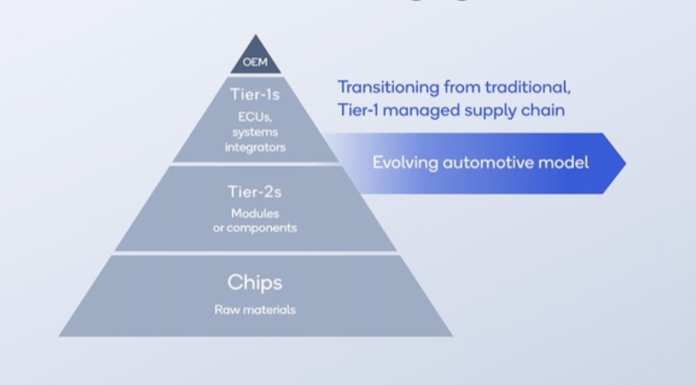Executives from BMW, General Motors, Great Wall Motor, Honda, Mercedes-Benz, Stellantis talk tech partnerships with Qualcomm
At a recent Automotive Investor Day event in New York City, Qualcomm executives updated the company’s automotive design win pipeline to $30 billion, and took a deep dive into how the digitalization of vehicles is a major growth engine for its products. During the program, executives from major global automotive OEMs appeared to discuss their partnerships with Qualcomm.
In March, Qualcomm announced it’s working with BMW Group and Arriver Software on cooperative development of automated driving technologies, including the use of the Snapdragon Ride Platform vision, compute and connectivity capabilities.
BMW CEO Oliver Zipse noted that the firms have worked together for a decade, and looked ahead to the 2025 launch of the company’s cluster architecture for electric vehicles. “Snapdragon platforms create world-class digital experiences and our customers enjoy this everyday around the world,” he said. “Our goal: the joint development of first-class, next-generation driver assistance technologies—this ranges from safety features to advanced solutions for Level 3 automated driving…Together we are developing trend-setting technologies for the future of digital and fully-connected mobility.”
General Motors CEO Mary Barra called out the automaker’s “once-in-a-lifetime transformation to electric and autonomous vehicles which is reshaping our approach to technology and innovation…It is essential to partner with the right companies…to foster innovation and deliver the very best vehicles, services and experience to our customers.”
Qualcomm and GM have a long-term and wide-ranging arrangement covering digital cockpits, vehicle telematics and advanced driver assistance systems.
In May Chinese automaker Great Wall Motor debuted its Mocca DHT-PHEV LIDAR Edition vehicles which uses the Snapdragon Digital Chassis, including connectivity and cockpit platforms. Great Wall Motors CTO Yuanli Wang said the company wants to become “a global technology-driven mobility company. Qualcomm has been an important technology provider and a close partner.” He also called out “joint development” on C-V2X connectivity.
Honda CEO Toshihiro Mibe said the company is using the third-generation Snapdragon Cockpit Platform into the U.S. market from the second half of 2022, bringing improvements in graphics, performance and usability. “In 2023 we will provide this model to the customers around the world. We would like to enhance the bigger information tool in the connected area through a stronger and better partnership with Qualcomm, and to work together in order to provide high value-added products and expanding our services which will satisfy our customers.”
Beginning in 2023, Qualcomm technologies will power Mercedes-Benz’s digital cockpits. CEO Ola Kallenius discussed how “luxury is in large part created in our customers perception. They have to see, feel and experience, and I am certain digital luxury done right adds a lot of value to that equation. That is why we’re incredibly pleased to extend our more than 10 years of successful collaboration with Qualcomm to keep working together on one of the most decisive and fascinating parts of future cars—the digital cockpit.”
Stellantis CEO Carlos Tavares described a “race to transform Stellantis…into a sustainble mobility tech company…We are confident the Snapdragon Digital Chassis will give us the horsepower we need to win, to create the most intelligent, customizable and immersive in-cabin experiences.” The two companies are working together across all 14 Stellantis brands to bring Snapdragon-powered experiences to vehicles beginning in 2024.

